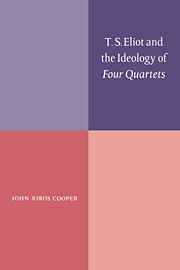Book contents
- Frontmatter
- Contents
- Acknowledgements
- List of abbreviations
- 1 Ash-Wednesday and the transition to the late candour
- 2 Provisional delusions: crisis among the mandarins
- 3 The society of the mandarin verse play
- 4 Representing Four Quartets: the canonizers at work
- 5 Four Quartets: the poem proper
- 6 White mythology: the comedy of manners in Natopolis
- Notes
- Works cited
- Index
4 - Representing Four Quartets: the canonizers at work
Published online by Cambridge University Press: 07 October 2011
- Frontmatter
- Contents
- Acknowledgements
- List of abbreviations
- 1 Ash-Wednesday and the transition to the late candour
- 2 Provisional delusions: crisis among the mandarins
- 3 The society of the mandarin verse play
- 4 Representing Four Quartets: the canonizers at work
- 5 Four Quartets: the poem proper
- 6 White mythology: the comedy of manners in Natopolis
- Notes
- Works cited
- Index
Summary
Eliot's authority in the period between 1939 and 1950 can be summarized in one word – ‘commanding’ (Mulhern, ‘Scrutiny’ 211 and cf. Davie, Companions 79). The war decade culminated in an honourary degree from Harvard in 1947, the Order of Merit in January of 1948, the Nobel Prize in November of the same year, a volume of essays of tribute edited by two young admirers, Tambimuttu and Richard March, in September, other tributes, and to cap it off, a hit play on Broadway in 1949 and, again, in the West End in early 1950. The Cocktail Party was a play that anyone who was anyone had to see even if most people in the audience were not sure what exactly the play meant.
Eliot was also in demand socially and, when he wanted to, he wore his celebrity easily. At a private celebration hosted by the literary mandarin Cyril Connolly on Eliot's return from Stockholm in 1948 the poet, uninhibitedly, sang ‘Under the bamboo tree’ from Sweeney Agonistes, much to everyone's delight (Ackroyd 290). For the then very fashionable Connolly, in the pages of Horizon, and in Palinurus's ‘word cycle’ The Unquiet Grave (1945), Eliot represented incontestable sagacity (96, 106, 107) and is always evoked as the ‘master’ (96). Connolly in those years saw himself as a bridge between the older generation of the established modernist masters and the younger avant garde. Eliot's ‘monumental reputation’ (Ackroyd 291) made him the central figure in what was left of the older generation and Connolly (and others) cultivated him with careful energy.
- Type
- Chapter
- Information
- T. S. Eliot and the Ideology of Four Quartets , pp. 100 - 121Publisher: Cambridge University PressPrint publication year: 1995



